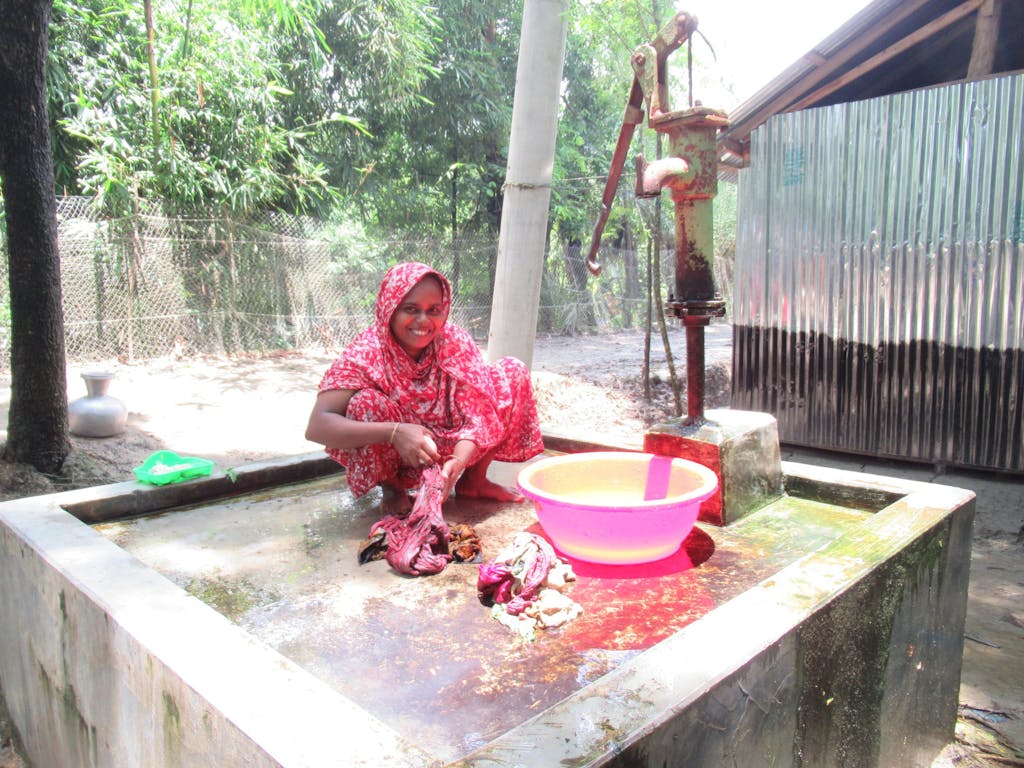Safe water was what Nargis needed. The 28-year-old mother lives in the Borobogi community of Bangladesh. But for so long, she didn’t understand how many of her problems were tied to her family’s need of clean water.
Like so many other families near their home, she and her two children – Siam, 12, and Fatema, 7 – were plagued by poor health that interfered with school, work, and even basic household tasks important to survival.
No Source for Safe Water
There was no clean water source near the community. The family was financially unable to afford installation of a well or to purchase water in any other way. They knew obtaining any water was important, but they didn’t even begin to understand how essential it was that they have access to clean water.
“We had no knowledge about the importance of using safe water,” Nargis explains. “And it was both difficult and unsafe for women and children to collect water from very far away.”
No Help Available for the Task
Like most men in the community, the father of Siam and Fatema was out of the house working or trying to find work during daylight hours.
“So men could not help in fetching water, and it was difficult for us to collect. It was far to go, there were dangers along the way, and it was heavy and hard to manage. Often it was also too late to take care of all the household chores and then collect water from far distances,” says Nargis.
This created conflicts within and between families, she says. “Additionally, when the children helped in collecting water, their studies were severely hampered,” she adds.
No One Even Searched for Solutions
“We felt so very helpless. There was no desire to do any work. The children could not concentrate on their studies. Sometimes hatred toward family life was created.”
It was a terrible cycle. Unclean water was causing poor health and endless maladies. Illness left family members weak and unable to work or attend school. It made even simple chores difficult. The family wasn’t able to dream big enough to imagine there could be a way to address the root cause of their problems.
Hope Arrives in the Community
Food for the Hungry (FH) arrived in Borobogi and started working in the community in December 2013. Within a couple of months, Nargis and her family were participating in the activities.
That’s when Nargis began to understand what was creating her problems.
“First I joined the savings team and participated in weekly meetings, where I received leadership development training,” Nargis explains.
Viewing the Bigger Picture
“FH shared the importance of using safe water at those meetings. Soon, I was able to assist in determining what demand there was for safe water. I also helped with preschool and after-school programs made possible by FH child sponsorship,” Nargis shares.
The assessments showed a desperate need for tube wells in the sector, and the community of Borobogi was selected to have a well installed through FH. As a result, families in the area now have easy-to-obtain safe water. They are no longer battling the illness and other side effects of water-borne diseases. And medical expenses and children’s absences from school have decreased dramatically.

Safe Water in the Community
“We no longer spend all that time on water collection, so there is enough time to maintain other household chores,” says Nargis.
“I can give more time to my children, and good relations have been established between family members and in the community. My children can keep themselves clean and they have become much more focused on their studies – and I can get some rest!”
Nargis says it has made all the difference. With installation of the tube well they are able to collect safe and clean water for about 40 families in a short time and with easy access.
Hope for the Future
“We are forever grateful to FH for this great support,” Nargis says. “We wish for the organization to grow so that they can continue this kind of work for helpless and poor people in other communities as they have for us.”
As for her family, she says, “We will continue to use safe water and live a healthy life by preventing diseases. Our dream is for our children to be able to go to school regularly, and be healthy and safe in the future.”
Continue Reading:
A Fresh Perspective on World Water Day
Good Neighbors Solve Their Irrigation Conflicts
How Handwashing Stations Kept Mothers and Babies Healthy in Kenya


